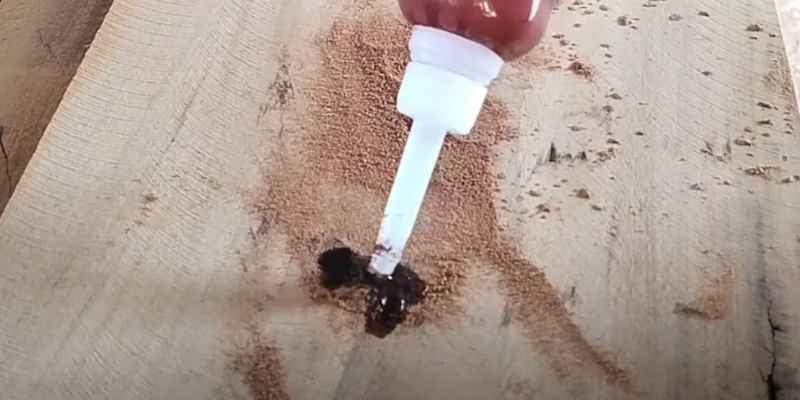Yes, Loctite Super Glue works effectively on wood. Loctite Super Glue is a strong adhesive suitable for bonding wood surfaces.
When searching for the best adhesive for wood-based projects, consider Loctite PL Premium Max as a reliable choice. In addition, polyurethane glue is also recommended for its versatility and durability in wooden furniture construction. Loctite Super Glue Liquid Universal is another excellent option for wood and various other materials, offering strong, waterproof, and temperature-resistant adhesive properties.
Overall, Loctite products provide reliable solutions for wood bonding applications, ensuring a secure and lasting bond for your woodworking projects.
How Loctite Works On Wood
When it comes to woodworking projects, ensuring strong and reliable bonds is crucial. If you’re considering using Loctite on wood, you might be wondering about its effectiveness. Understanding how Loctite works on wood and the mechanism behind it is essential for achieving successful results.
Understanding Wood As A Material
Wood, as a natural material, possesses unique characteristics such as grain patterns, porosity, and moisture content. These factors directly influence how adhesives interact with the surface. Understanding the properties of the wood you’re working with is fundamental for choosing the right adhesive and achieving optimal bonding.
Mechanism Of Loctite On Wood
Loctite, a popular adhesive brand, offers a range of products designed for various materials, including wood. The mechanism of Loctite adhesives on wood involves forming a strong and durable bond by penetrating the wood’s pores and creating a secure connection between surfaces. The adhesive cures to create a resilient bond, ensuring stability and longevity.
Types Of Loctite For Wood
Loctite offers various options for wood projects, including Super Glue ULTRA Gel Control, Super Glue Liquid Professional, and Super Glue Gel Control. These strong adhesives are suitable for bonding wood with precise application and durability, making Loctite a reliable choice for woodworking tasks.
Different Variants
Loctite offers various types of adhesives suitable for wood projects, each with unique properties and applications.
Best Loctite For Wood Projects
For most wood-based projects, Loctite PL Premium Max is a solid choice due to its reliability and durability.
Loctite Super Glue Ultra Gel Control™
- Works well for precise applications on wood surfaces.
- Provides strong and quick bonding.
Loctite Super Glue Liquid Professional
- Offers excellent bonding on wood with a professional finish.
- Great for intricate wood projects
- Perfect for vertical applications and porous wood surfaces.
- Easy to control and less messy during application.
Loctite Wood Glue
- Ideal for strong and lasting wood-to-wood bonding.
- Provides a reliable hold for woodworking projects.
Comparing Loctite With Other Wood Glues
Loctite offers a range of wood glues that are specifically designed for bonding wood. From their Super Glue ULTRA Gel Control™ to their Super Glue Liquid Professional, Loctite provides strong and reliable adhesion for various woodworking projects. With their adhesive technologies, Loctite ensures that their glues work effectively on wood surfaces.
Strength And Durability
When it comes to strength and durability, Loctite excels as a wood glue. Loctite wood glue is specially formulated to provide maximum bonding strength, ensuring that your wood projects stay intact for a long time. It creates a strong and rigid bond that is resistant to stress, impacts, and vibrations. With Loctite, you can trust that your wood joints will remain secure and withstand heavy usage.
In comparison, other wood glues may not offer the same level of strength and durability as Loctite. Some traditional wood glues may be weaker and less reliable, leading to joint failures and weaker bonds. It’s important to choose a wood glue that is specifically designed for the demands of woodworking projects, like Loctite, to ensure the best results.
Waterproofing And Heat Resistance
Woodworking projects often require a strong bond that can withstand exposure to moisture and heat. Loctite wood glue is formulated to be waterproof and heat-resistant, making it ideal for outdoor applications or projects that may encounter harsh elements.
Loctite’s waterproof and heat-resistant properties ensure that its bond remains strong even in damp and humid conditions. It can withstand fluctuations in temperature without compromising the integrity of the joint. This makes Loctite suitable for a wide range of woodworking projects, including furniture, outdoor structures, and decorations.
On the other hand, traditional wood glues may not have the same level of waterproofing and heat resistance as Loctite. They may not be able to handle the expansion and contraction caused by moisture and temperature changes, leading to weakened bonds and potential damage to the wood.
In conclusion, when comparing Loctite with other wood glues, Loctite stands out for its exceptional strength, durability, waterproofing, and heat resistance. Its specialized formula ensures reliable and long-lasting bonds in wood projects. Whether you’re working on a small DIY project or a large woodworking endeavor, Loctite is a reliable choice that won’t disappoint.
Factors Affecting Loctite’s Performance On Wood
Factors affecting Loctite’s performance on wood may include the type and condition of the wood, humidity levels, and proper surface preparation. Loctite offers different products specifically designed for wood bonding, such as Loctite Wood Glue and Loctite Super Glue Gel Control, which provide strong and durable adhesion on wood surfaces.
When it comes to bonding wood, Loctite is a popular choice due to its strong adhesive properties. However, there are several factors that can affect Loctite’s performance on wood. Understanding these factors is crucial to ensure a successful bonding process. Let’s take a closer look at the surface conditions and environmental factors that can impact Loctite’s effectiveness on wood.
Surface Conditions
The condition of the wood surface plays a significant role in Loctite’s bonding performance. Before applying the adhesive, it is essential to prepare the wood surface properly. Here are some factors to consider:
- Surface Cleanliness: Ensure that the wood surface is clean, free from dust, dirt, and any other contaminants. Wipe the surface with a clean cloth or use a mild detergent if necessary.
- Surface Texture: Roughening the surface can enhance the adhesive’s grip on the wood. Sanding the surface gently can create a better bonding surface for Loctite.
- Surface Moisture: Wood with high moisture content can hinder the adhesive’s performance. It is important to ensure that the wood is dry before applying Loctite.
Environmental Factors
In addition to surface conditions, environmental factors can also affect Loctite’s performance on wood. These factors include:
- Temperature: Loctite performs best within a recommended temperature range. Extreme temperatures can affect the adhesive’s curing process and overall bond strength. It is important to check the manufacturer’s guidelines for the optimal temperature range.
- Humidity: High humidity levels can impact Loctite’s curing time. If the wood surface is exposed to high humidity, it is recommended to allow sufficient time for proper curing.
- Exposure to Moisture: Wood that is constantly exposed to moisture or immersed in water may require a specialized adhesive designed for water resistance. Loctite offers specific products suitable for such applications.
By considering these surface conditions and environmental factors, you can optimize Loctite’s performance on wood and ensure a strong and long-lasting bond. Remember to follow the manufacturer’s instructions and recommendations for the specific Loctite product you are using.
Expert Reviews And Recommendations

Various tests have shown that Loctite adhesives can effectively bond wood surfaces. The strength and durability of these bonds have been analyzed by experts to determine the reliability of using Loctite on wood.
Best Practices For Using Loctite On Wood
- Choose the Right Loctite Product: Select a Loctite adhesive suitable for wood bonding, such as Loctite PL Premium Max, known for its strong hold on wood surfaces.
- Surface Preparation: Ensure the wood surface is clean, dry, and free from any debris before applying the Loctite adhesive.
- Proper Application: Follow the instructions provided by Loctite for the correct application technique to achieve the best results.
- Curing Time: Allow sufficient time for the adhesive to cure and set properly before exposing the bonded wood to stress or load.
- Temperature and Humidity: Consider the environmental conditions during bonding, as temperature and humidity can impact the adhesive performance on wood.
Frequently Asked Questions Of Does Loctite Work On Wood
Does Loctite Threadlocker Work On Wood?
Loctite Threadlocker does not work on wood; it is specifically designed for metal. For wood, consider Loctite Super Glue Liquid Universal, a strong and resistant adhesive suitable for various materials.
What Is The Best Loctite For Wood?
The best Loctite for wood is Loctite PL Premium Max. It is a solid choice for most wood-based projects.
What Will Loctite Not Stick To?
Loctite does not stick to High-Density Polyethylene Plastic, wet surfaces, very smooth surfaces like glass.
Which Glue Is Best For Wood?
The best glue for wood is polyurethane glue, known for its versatility and resistance to water and heat. It’s an excellent choice for wooden furniture construction. Another option is Loctite Super Glue Liquid Universal, which is strong, waterproof, and temperature resistant, suitable for various materials, including wood.
Conclusion
In essence, Loctite can be effective on wood, particularly with products like Loctite PL Premium Max. However, it is important to note that Loctite Threadlocker is specifically designed for metal use. When choosing a wood glue, consider Polyurethane Glue for its robust qualities.
Remember to match the glue to your specific wood project needs.


